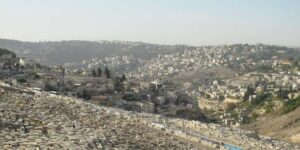What’s More Important Than Praying for Messiah’s Arrival?
In 1867, Mark Twain visited Israel and wrote in his travel book Innocents Abroad that the land was “a desolate country whose soil is rich enough, but is given over wholly to weeds … a silent mournful expanse … a desolation … hardly a tree or shrub anywhere. Even the olive tree and the cactus, those fast friends of a worthless soil, had almost deserted the country.”
Today, Twain’s reaction to the holy land would be entirely different. Over 250 million trees have been planted in Israel over the past century in fulfillment of biblical prophecies.
“Every tree planted in Israel is a testament that God is faithful to His word,” shared Rabbi Tuly Weisz, Director of Israel365, an organization highlighting the connection between the Bible and Israel and building bridges between Jews and pro-Israel Christians worldwide. “As it says in Isaiah, ‘The Lord will surely comfort Zion and will look with compassion on all her ruins; He will make her deserts like Eden, her wastelands like the garden of the Lord'” (Is. 51:3, The Israel Bible).
This Saturday, Feb. 11, marks the Jewish holiday of Tu B’Shvat (the 15th day of the Hebrew month of Shvat). This day is referred to in the Talmud as the “New Year for Trees.” It is like a Jewish “Arbor Day” with significant biblical considerations.
“Tu B’Shvat is the premiere time to show appreciation for the beauty, fruits and health benefits that trees provide, especially in Israel,” noted Rabbi Weisz.
“So important are planting trees in Israel that the ancient rabbis in the Talmud taught us that if a person is planting a tree and hears that the Messiah has arrived, he should finish planting the tree before going to greet the Messiah!”
In Israel, it is a universal custom to plant trees in honor of Tu B’Shvat. Over a million Jewish Israelis are expected to take part in Tu B’Shvat tree planting activities this week. Additionally, the Israeli holiday is commemorated by partaking in the seven special foods for which the Bible praises Israel: “It is a land of wheat and barley, grapes, fig trees and pomegranates; a land of olive trees and dates” (Deut. 8:8, The Israel Bible).
This past November, Palestinian terrorists destroyed 130,000 dunams of Israeli forests, making the replenishment of the land an urgent mission. To that end, Israel365 has a Tree Planting Campaign to encourage all lovers of the Holy Land to donate toward its reforestation.
Deuteronomy 20:19-20 states, “When you besiege a city a long time, to make war against it in order to capture it, you shall not destroy its trees by swinging an axe against them; for you may eat from them, and you shall not cut them down. For is the tree of the field a man, that it should be besieged by you?”
Rabbi Weisz explained that these phrases not only emphasize the holiness of every tree but also compares mankind to a tree. Tu B’Shvat is a particularly good day for people to cultivate strong spiritual roots by increasing their good deeds. “Judaism teaches that the earth belongs to God and we are His partners in preserving the planet and its resources,” he said. “I pray that those people who love Israel will join Israel365 in celebrating Tu B’Shvat and plant a tree in Israel to strengthen both their spiritual and physical roots in Israel.”







































